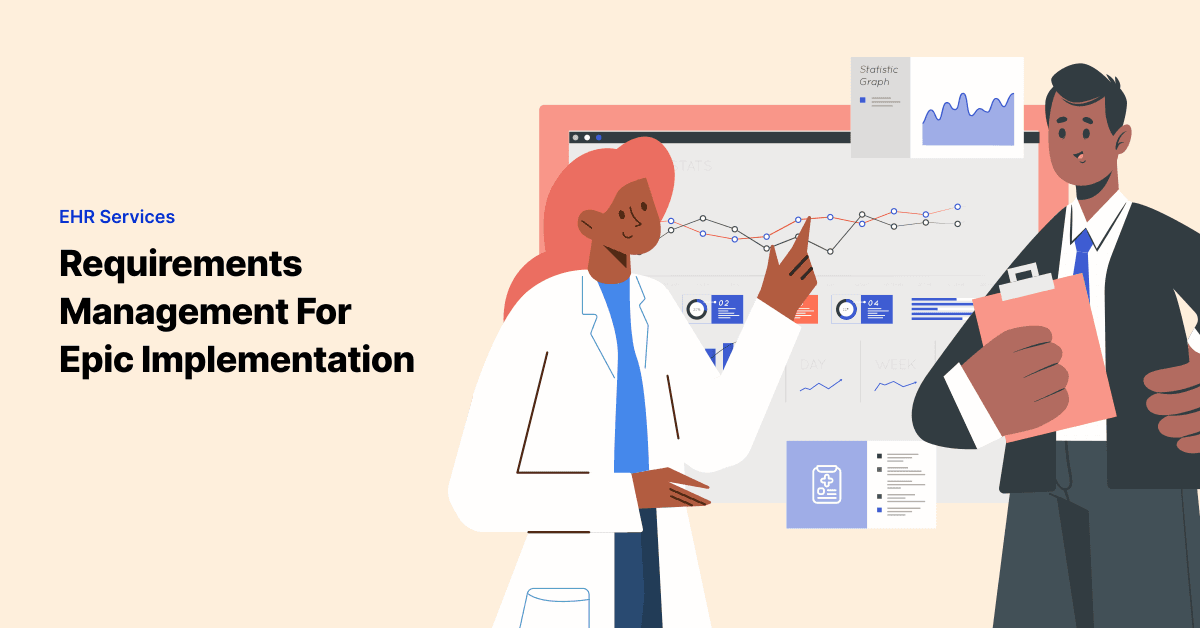
The Importance of Requirements Management for Epic Implementations
Despite the tech savviness of most hospital IT departments, one of the challenges that comes when implementing …

Implementing an EHR like Epic for a large health system is a hefty task, and there are many specialized players involved to make it happen. One of the key roles is the Project Manager. Depending on the size of the team, PMs can wear many hats in the course of supporting the EHR project team. But there are a few key tasks that are the responsibility of the PM in order to execute well and on time. We’ll look at a few specific responsibilities that shape the role of the Project Manager in EHR implementation projects, and speak to the importance of this position and the person who fills it.
While there is generally an Account Manager or PM from the EHR vendor assigned to a given implementation, there are typically more than just the vendor and hospital involved. Network vendors, third-party apps, HIEs and more will require coordination and consideration to ensure that the health system can continue to get the data expected to care for their patients. The Project Manager assigned to the overall EHR implementation project will be the centralized source of information and collaboration to account for the variables and resources required for full-scale integration.
The implementation PM will maintain a list of contacts, timelines for vendor dependencies, tickets associated with vendor work and more. Given these important tasks, an ideal Epic Project Manager should be:
It’s helpful to think of the PM as the glue that holds the implementation efforts together, uniting them under a shared project plan, timeline and budget.
Speaking of timeline, one of the most challenging tasks with any given project is coming up with a timeline for delivery. Not only does this directly impact the budget (since resources cost money, generally in regard to time spent), but operationally, a health system can’t plan for Epic Go-live and support without a sense of when the technical aspects will be completed, validated, and ready for training and roll out.
For this reason, a technical project manager for EHR implementation must be able to drive the definition of scope and level of effort to come up with a picture of when each phase of the project will be complete. This generally requires documenting requirements and clarifying roadmap items versus “in scope” deliverables, obtaining estimates from developers and vendors and mapping out the dependencies and expectations in both visual and quantifiable ways for the various stakeholders. Tools like Jira or Microsoft DevOps can be helpful for PMs who are looking to track work based on a backlog of tickets and estimated hours or story points, but even utilizing Smartsheets, Excel or Google Sheets can get the job done. It’s less about the form and more about the function, ensuring everyone on the project has access to critical delivery dates, dependencies and risks.
While some of the best healthcare project managers we’ve worked with wouldn’t necessarily consider themselves technically savvy, it’s important that whoever is at the helm of the EHR implementation has the confidence and professionalism to dig in and address problems as they occur. This requires a combination of soft skills — such as patience, conflict resolution, empathy and creative thinking — and the ability to at least speak the language of healthcare IT well enough to convey and distill information related to facts.
It’s the job of an Epic Project Manager, for example, to call out when a key milestone in the timeline is missed or in jeopardy. The job, of course, isn’t to assign blame, but to raise the concern, press into why it happened, encourage brainstorming to remediate the issue and make it clear who is responsible for what to prevent further delays. In general, the project team owns the solution and execution, but the PM creates the space and sets the tone for how smoothly (or not) that occurs.
It takes a whole team to implement an EHR for hospitals, and while no single role is elevated above others, putting an ill-equipped resource in the seat of Project Manager could have a troubling ripple effect across the entire initiative. When chosen well, however, a good technical PM can unite a given team to accomplish great things…on time.
Join over 3,200 subscribers and keep up-to-date with the latest innovations & best practices in Healthcare IT.

Despite the tech savviness of most hospital IT departments, one of the challenges that comes when implementing …

Health systems embarking on Epic integration projects are rarely doing so to exist in a bubble. The goal we …

The range of vendors and healthcare IT solutions on the market offer unprecedented choices to health systems …